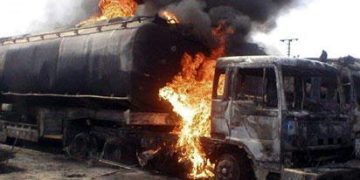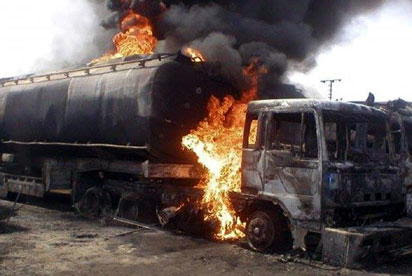An overnight tanker fire along the Abeokuta–Sagamu Expressway has reportedly claimed several lives, though the exact number of casualties has not yet been confirmed.
The spokesperson for the Ogun State Traffic Compliance and Enforcement Agency (TRACE), Babatunde Akinbiyi, told reporters on Friday that the incident occurred around 1 a.m. when a petrol-filled 33,000-litre tanker overturned after the driver lost control due to excessive speeding.
According to Akinbiyi, the crash caused the tanker to spill fuel on the road, sparking a massive fire that spread quickly to nearby vehicles and electricity poles.
“The inferno was triggered when the tanker, loaded with petrol, fell and spilled its contents along the Abeokuta–Kobape–Siun–Sagamu interchange. The fire later engulfed a truck, a tow vehicle parked by the roadside, and also damaged a PHCN cable supplying power to Mowe and surrounding communities,” he explained.
Emergency responders, including TRACE, the Ogun State Fire Service, Nestlé Fire Service, FRSC, police, and other security agencies, rushed to the scene. They worked to extinguish the flames, secure the area, and begin fuel evacuation.
Traffic in the affected corridor has since been restricted to a single lane while rescue operations continue. Motorists have been advised to remain patient and cooperate with officials directing traffic flow.
“We appeal to the public, especially road users in the area, to remain calm and comply with the diversions in place. We regret the inconveniences caused by this tragic incident,” Akinbiyi added.
Tanker fire accidents remain a recurring hazard in Nigeria. In October 2024, a similar incident on the Lagos–Ibadan Expressway at Ibafo killed one person and destroyed several vehicles. In July 2025, another petrol tanker exploded in Ibadan following brake failure, damaging multiple vehicles.
Experts have repeatedly linked the severity of such accidents to poor enforcement of road safety laws, inadequate regulation of fuel transportation, slow emergency responses, and public recklessness during fuel spills.















